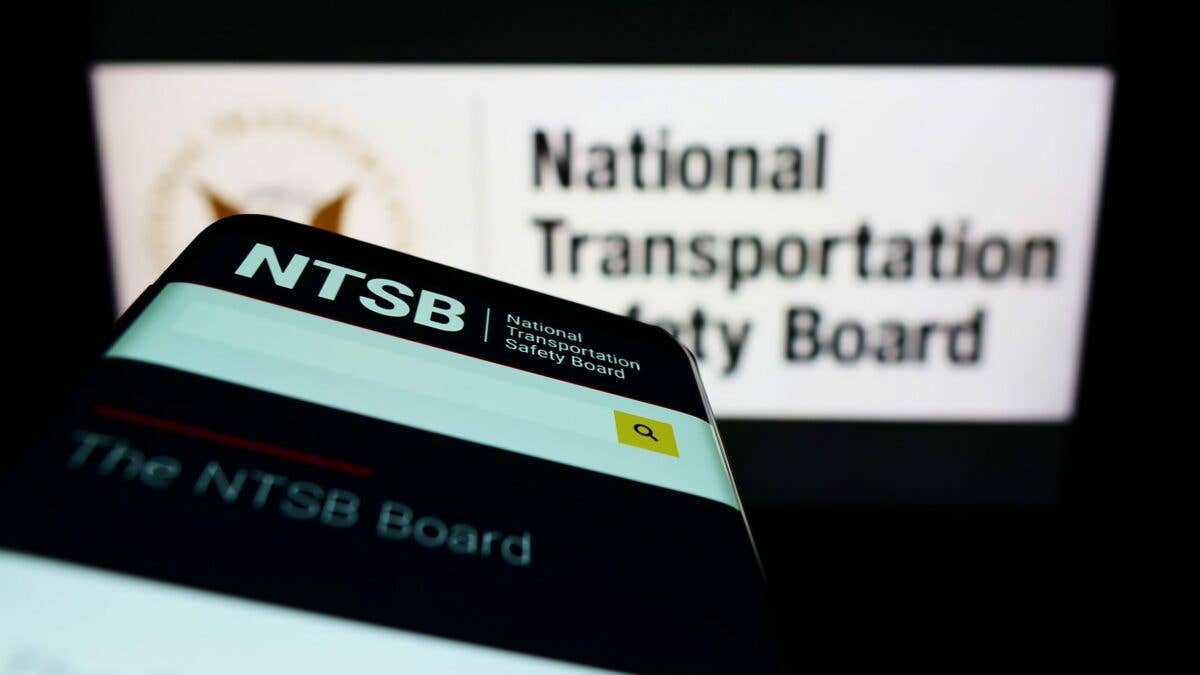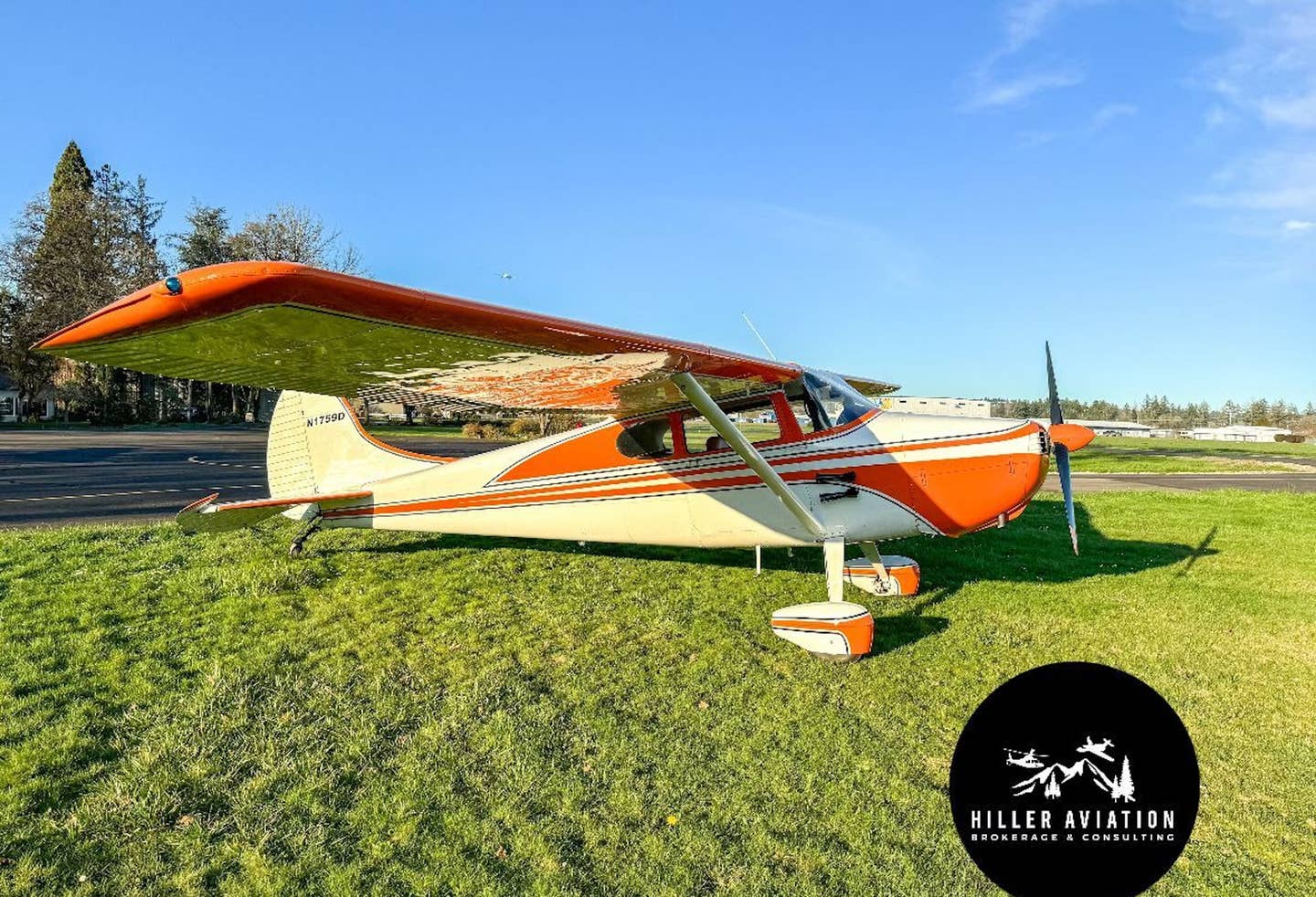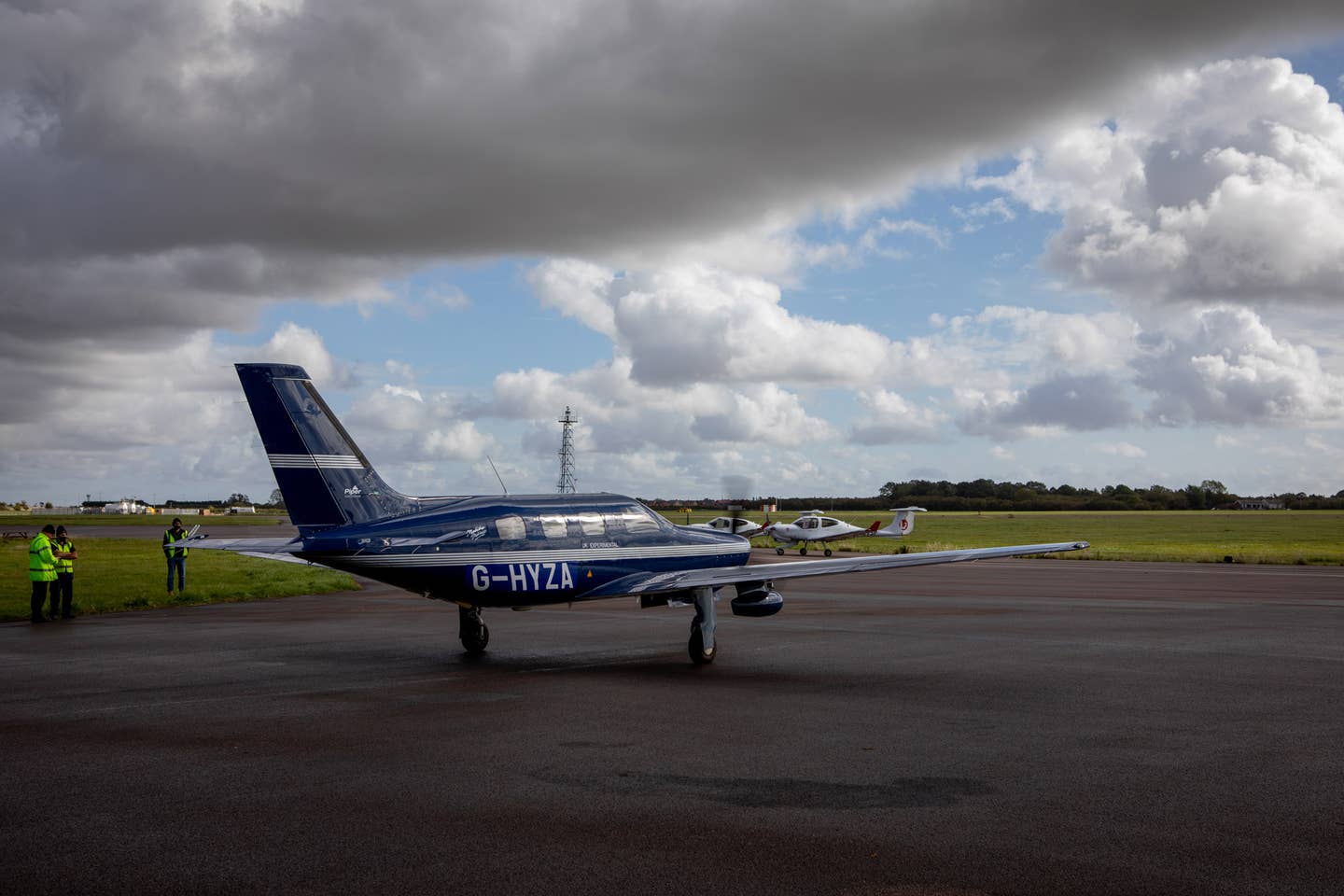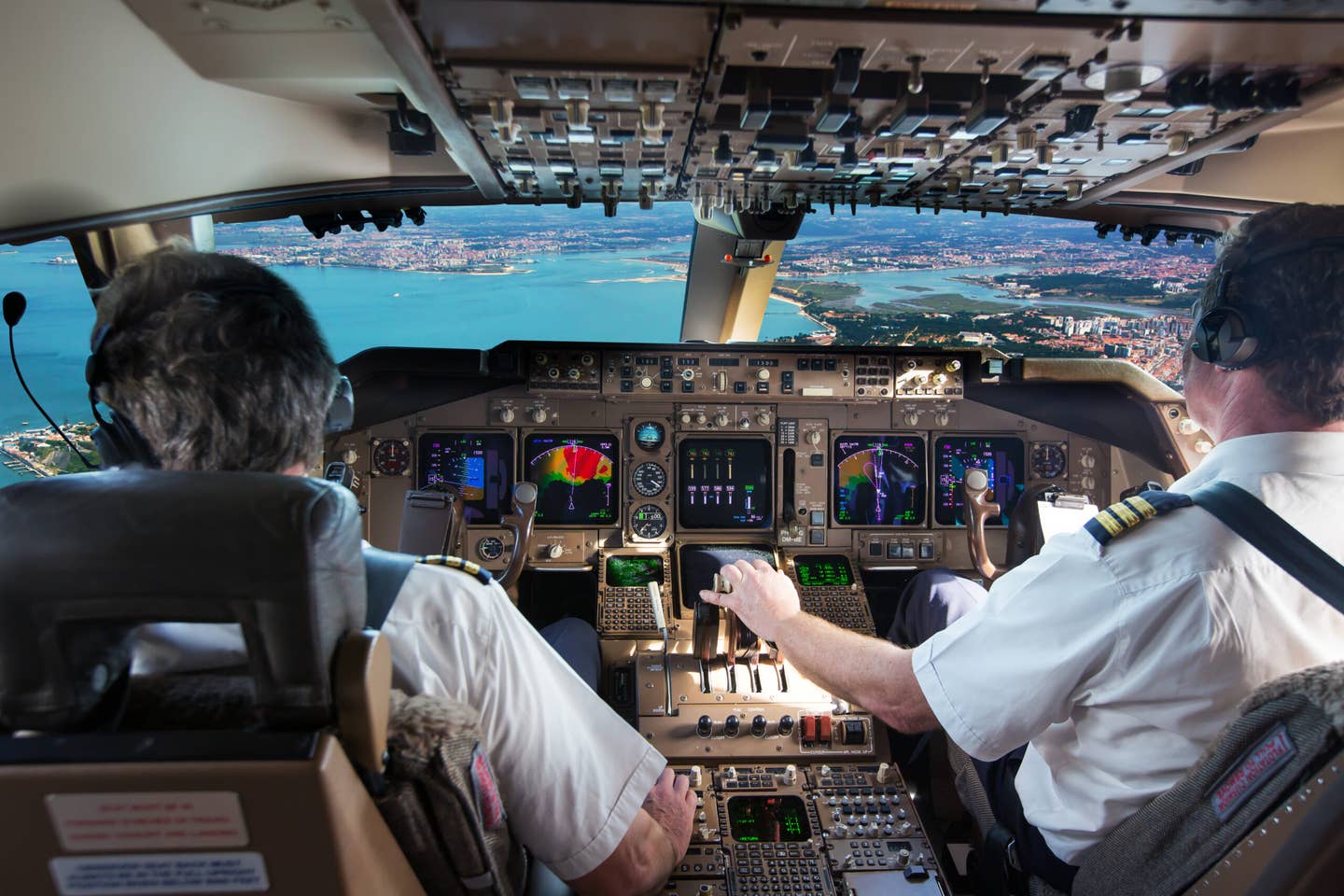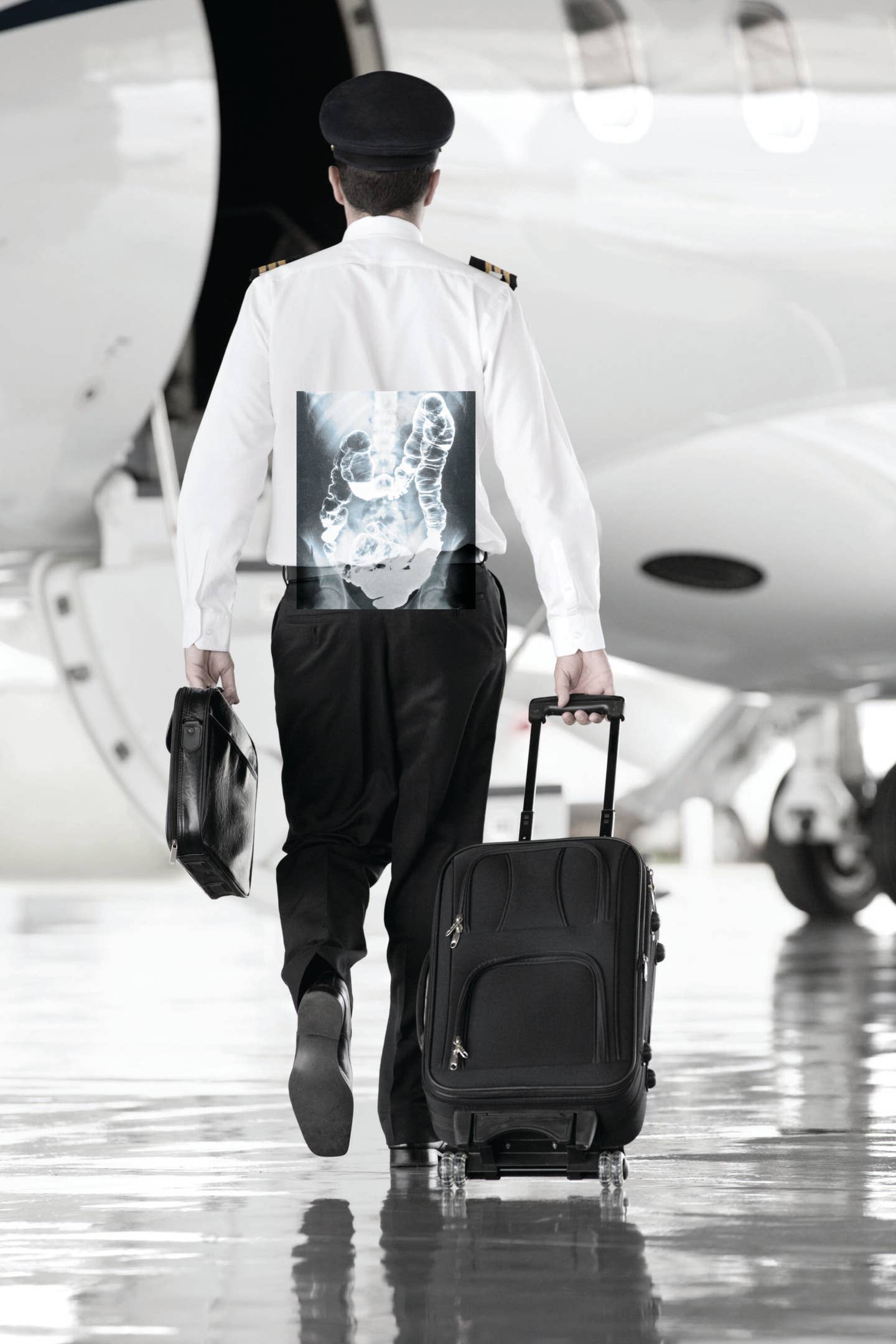
More than 2,000 pilots are currently flying with inflammatory bowel disease. Alamy
Nearly as long as I can remember, I’ve wanted to be a pilot — nothing more, nothing less. I said as much in a second-grade project that my mother saved for posterity. Over time I developed additional interests and even dabbled with the idea of becoming an architect or practicing law, but I never seriously pursued either option. Against the conventional advice that a professional pilot should obtain a nonaviation fallback degree, I went to the aviation-centric University of North Dakota and majored in air transport. I didn’t even bother with a minor, much less a second major. Young and eager to take on the world, it was aviation or bust. I never gave “What if you can’t?” much thought. I always assumed that I could. My parents never actually spoke the modern trope that my siblings and I could do anything we set our minds to, but their actions clearly reflected that belief, and we all ran with it. Failure, even due to circumstances beyond one’s control, wasn’t much considered. “God will provide,” my parents pronounced with a confidence borne of personal experience.
Which brings me to a bleak morning in November 2012. I’m sitting in a pale-green, harshly lit medical office, staring blankly at an anatomical poster through choked-back tears, gripping my wife’s hand and half-listening to the doctor while struggling to process what he just told me. After spending the night doubled over with intense abdominal pain, I had finally consented to a rare visit to the clinic and had lain down for the CT scan, assuming I’d be having my appendix taken out today. Thus, the pronouncement came as a shock: “The good news is you do not have appendicitis. The bad news is you have an inflamed ileum, and I think it’s Crohn’s disease.” I know that word. Two acquaintances of ours have Crohn’s, and their lives have been a hellstorm of incessant pain, ineffective medication, futile surgeries, withered bodies, strained marriages and wrecked careers. Oh no, my career. Certainly I can’t fly with this. The doctor is distantly explaining that there are many levels of severity and many cases are quite treatable, but I barely hear him over the master warning alarm blaring in my head.
My life changed forever that day, but not nearly as much as I initially feared it might. I calmed down, went home, and started researching the mysterious inflammatory bowel disorder. As an autoimmune disease, Crohn’s is a close relative to rheumatoid arthritis, except the immune system erroneously attacks the gut rather than the joints. There is no cure, only treatments to control its effects. These used to be confined to managing the symptoms, but a new generation of biologic drugs treats the underlying problems by suppressing both the immune system and the protein that is widely assumed to trigger the disease. These new drugs, while rather expensive, have proven effective over the long term in many patients. Better yet for my purposes, the FAA allows their use as the basis of a special-issuance Class 1 medical. There are now more than 2,000 pilots flying with Crohn’s or ulcerative colitis.
Crohn’s can be tricky to diagnose, so on the advice of the Air Line Pilots Association’s excellent Aviation Medicine Advisory Service (AMAS), I continued to fly until the diagnosis was certain, so long as I was asymptomatic. Over the next three weeks, I flew three trips for the regional airline for which I was a captain at the time. They were some of the best of my career, with great flying and fantastic layovers spent with some of my favorite first officers and flight attendants at the airline. New York, Missoula, Louisville — we went out together every single night. Then on December 21, following an MRI and a colonoscopy, I was definitively diagnosed with Crohn’s disease. I was officially grounded.
My gastroenterologist immediately put me on Remicade, one of the wonder drugs approved by the FAA. Oklahoma City wanted to see at least three doses without side effects, after which I could submit a bevy of paperwork and apply for a special-issuance medical with AMAS’s help. The initial three doses took six weeks, and subsequent treatments would occur every eight weeks thereafter, ad infinitum. In the meantime, I was out of work, mostly without pay thanks to my regional airline’s miserly sick-time allowance and lack of short-term disability coverage. It’s funny, you never think much about these things when you’re young and healthy. I considered getting a temp job, but with the end of the holidays, the pickings were pretty slim.
Sitting at home, I had entirely too much time to think about the future. What if the Remicade didn’t work or I reacted poorly? What if the FAA delayed my special-issuance medical or rejected my application altogether? What about my long-term prognosis? I suspected I’d been living with mild Crohn’s for nearly a decade, writing off occasional stomachaches to food allergies — but nothing guaranteed it would stay mild, even with medication. What if I eventually couldn’t fly for a living, or even for fun? My wife was completely supportive through all this, but I still felt frustrated, alone and adrift.
Throughout these gray months, my flying club’s Piper Cub helped keep me sane. Because I hadn’t been denied a medical, I was still legal to fly Light Sport as long as I was asymptomatic and self-certified my fitness to fly. Never have I been so appreciative of the Experimental Aircraft Association and the Aircraft Owners and Pilots Association’s efforts on Capitol Hill. Every time the winter weather cleared, I’d bundle up, head out to Airlake Airport and shovel out the club hangar for a blissful hour aloft. Sometimes I went alone, sometimes I called up friends. The effect was wonderfully restorative. That little yellow airplane kept my spirits up when I needed it most.
Each Remicade treatment consisted of sitting in a hospital chair with an IV in my arm for two hours, for which the hospital billed my insurance company an insanely inflated $4,000 (recently increased to $8,000); the medicine itself retails for a “mere” $1,000 per dose. My newfound familiarity with this country’s healthcare system has convinced me that it is sorely in need of drastic changes above and beyond the Affordable Care Act. That said, Remicade certainly proved effective; the inflammation subsided, and my symptoms never resurfaced. After the third dose, I sent off a sheaf of medical records for AMAS to submit with my FAA application package. The response was expected to take somewhere between six to 12 weeks.
While I waited, my good friend Brad Phillips and I hatched a plan to ride dirt bikes down the length of Mexico’s Baja Peninsula. I grew out my beard to look the part, something to which every male airline pilot aspires but few achieve (beards are normally prohibited because oxygen masks don’t seal well around them). The Baja trip was every bit the adventure we hoped for, though in none of the ways we intended. Then, at an Internet cafe in San Ignacio, I got a welcome surprise: My new best friends at FAA Aeromedical had approved my application in record time, not quite four weeks. Soon I would fly again.
Well, not quite yet. My landing currency had expired, and my airline was short on simulator time, so it waited until April to combine landing requalification with my six-month check ride. That gave me time to fly back down to Baja in March and complete the ride to Cabo San Lucas. The simulator ride and subsequent line check proved much easier than expected; though it felt like I’d been out a long time, it was really less than four months, and everything came back quickly. I was giddy at the prospect of returning to the line and eager for the camaraderie of the cockpit and sociable layovers with friendly crew. Alas, I must have drawn the short stick when bidding — I was slam-clicked by antisocial crew members for three weeks straight.
Since then, a combination of diet and Remicade has kept the Crohn’s in check and me in the cockpit. How much longer this happy state of affairs will last, nobody can say — least of all any medical professional. Even with medication, Crohn’s can cause potential side effects that could ground me for good — particularly colon cancer, which will require frequent screening. I hope to fly for fun and profit to a ripe old age, but there are no guarantees, and I consider every single flight a gift. My enforced absence from the sky did convince me of one thing: Aviation is forever in my blood, and medical or no medical, it will be my career field for the duration. There are plenty of things one can do in this industry without actually manipulating the controls of an airplane, and I’ll make that transition if and when the time comes. The only thing I ask, really, is that I’m still allowed to go out to the airport on nice sunny days and putt around in a little yellow Cub that never fails to make my heart soar.

Sign-up for newsletters & special offers!
Get the latest FLYING stories & special offers delivered directly to your inbox

